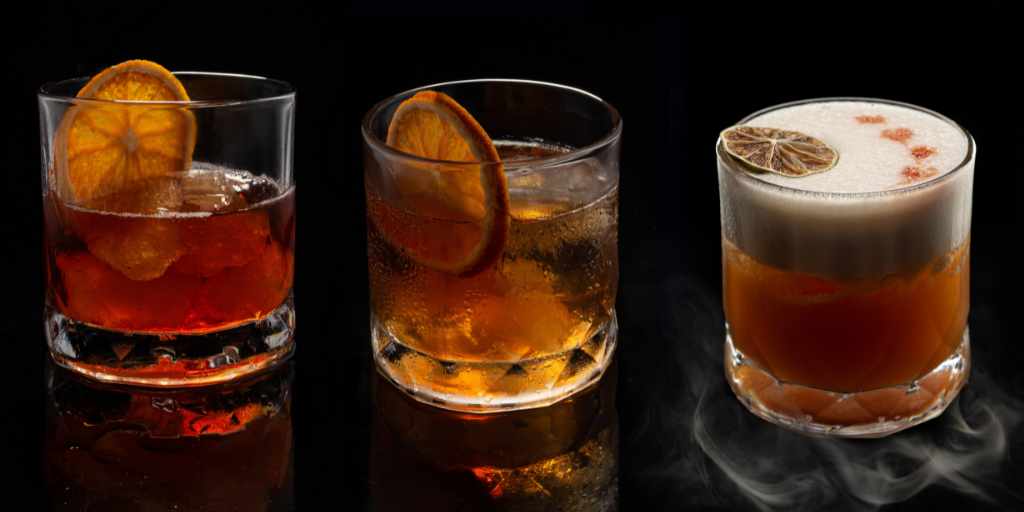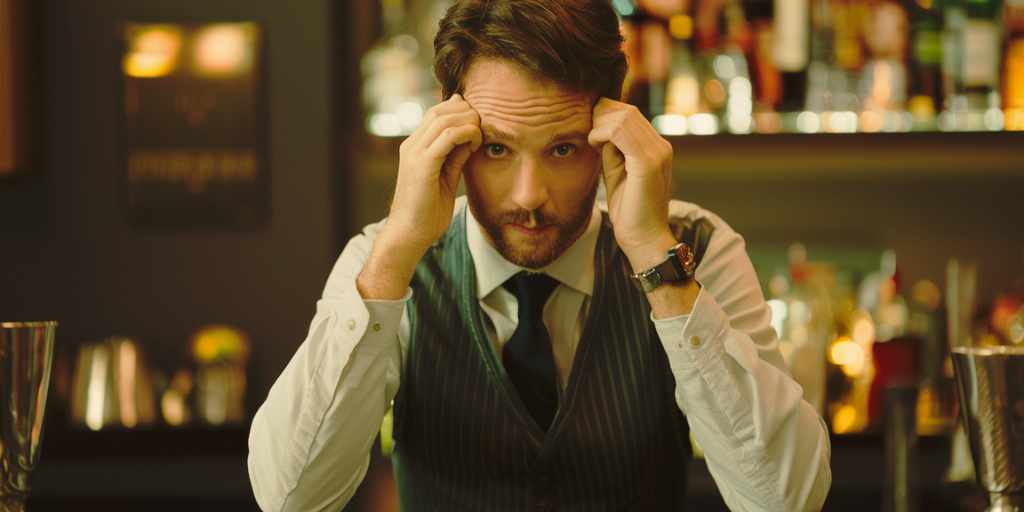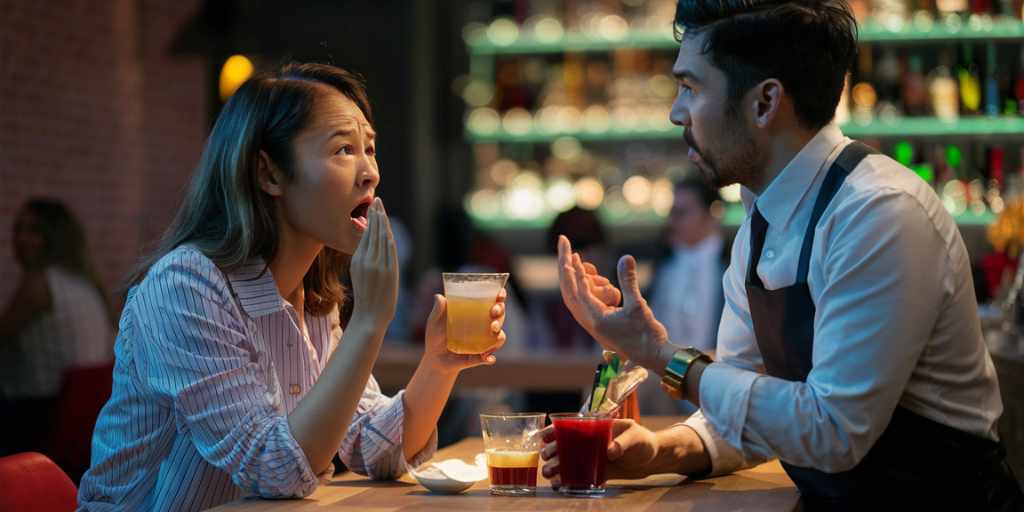Are you passionate about crafting exquisite cocktails and exploring the world of mixology? As mixology gains popularity in the beverage industry, many aspiring enthusiasts seek guidance on becoming skilled mixologists.
This comprehensive guide aims to provide you with the knowledge and resources needed to embark on your mixology journey.
Key Takeaways:
- Mixology is a growing field within the beverage industry, offering exciting opportunities for cocktail enthusiasts.
- Mixology is considered a culinary art that combines creativity and scientific principles.
- A mixologist should know bartending techniques, various spirits, cocktails, flavours, and balanced drink creation.
- Becoming a mixologist requires practical bartending skills and a deep understanding of mixology methods.
- Mixologists and bartenders have distinct roles, with mixologists specializing in crafting unique and innovative cocktails.
Work Experience to Learn Bartending Skills
Acquiring essential bartending skills through hands-on work experience is crucial to becoming a mixologist. By working in a bar or restaurant setting, you can gain practical knowledge and develop key skills that form the foundation of mixology.
During your bartending journey, you’ll learn the art of crafting different types of cocktails, perfecting your pouring technique, and familiarizing yourself with various spirits, liqueurs, and mixers. Furthermore, you’ll gain valuable customer service experience and learn to work efficiently under pressure.
Mixology Methods
Diving into the various mixology methods used to create exceptional cocktails is essential for aspiring mixologists. Mixologists employ multiple techniques and approach to craft unique and memorable drinks.
Understanding flavour profiles, balance, and presentation is paramount in mixology. Mixologists can create harmonious flavour combinations by experimenting with different ingredients, techniques, and proportions. The art of mixology involves using fresh and high-quality ingredients to enhance cocktails’ taste and visual appeal.
Bartending School and Professional Mixology Courses
Enrolling in a professional mixology course can significantly enhance your skills and knowledge. These courses provide a structured and comprehensive approach to learning mixology, covering essential topics and techniques.
Professional mixology courses offer valuable insights into the history of cocktails, mixology fundamentals, advanced techniques, and the latest trends in the industry. Attending these courses allows you to gain hands-on experience, learn from experienced instructors, and connect with fellow mixology enthusiasts.
Mixology Certification Program
Obtaining industry-recognized certifications can boost your credibility as a mixologist and open doors to exciting opportunities. Mixology certification programs validate your knowledge, skills, and expertise, enhancing your professional profile.
Reputable certification programs taught at a bartending school assess your theoretical knowledge and practical abilities through exams, evaluations, and demonstrations. Achieving a mixology certification not only provides a competitive edge but also demonstrates your commitment to excellence.
Show off your original cocktail creations.
Showcasing your creativity by sharing your original cocktail creations is an excellent way to gain recognition and build your personal brand as a mixologist. Whether featuring your cocktails on a drink menu, sharing them with friends and family, or showcasing them on social media, these platforms offer visibility and feedback.
Capturing appealing photographs of your cocktails and developing an enticing drink menu can help attract patrons and create a memorable guest experience. Hosting cocktail parties and gatherings allows you to receive feedback, refine your skills, and expand your network within the industry.
The Shaking Method
Mastering the art of shaking cocktails with precision and finesse is an essential skill for every mixologist. Shaking is a fundamental technique that blends ingredients, chills the drink, and adds texture and dilution.
To achieve optimal results, ensure you have the right tools and equipment, such as a quality cocktail shaker and strainer. Follow these steps to perfect your shaking technique:
- Add the ingredients to the shaker.
- Seal the shaker tightly to prevent any leaks.
- Hold the shaker firmly with both hands.
- Shake the shaker vigorously, using a back-and-forth motion.
- Strain the cocktail into a glass, using a strainer to catch any ice or solid ingredients.
Mastering the shaking method requires practice and a keen sense of timing. You can create well-mixed cocktails with a delightful texture and temperature by achieving the perfect balance of shaking duration.
What Resources Are Required to Become a Mixologist?
To embark on your mixology journey, there are several essential resources you’ll need to acquire. These resources include tools, equipment, reference materials, and quality ingredients.
Tools and Equipment: Invest in a well-stocked bar kit that includes essentials such as a cocktail shaker, mixing glass, jigger, strainer, muddler, bar spoon, and citrus press. Additionally, consider acquiring specialized tools for advanced techniques, such as a molecular mixology kit or a smoking gun.
Reference Materials: Build a collection of cocktail recipe books, flavour pairing guides, and mixology journals. These resources will provide inspiration, educate you on different cocktail styles, and guide you in developing your own recipes.
Quality Ingredients: Use fresh and high-quality ingredients to elevate the flavours and presentation of your cocktails. Invest in premium spirits, liqueurs, bitters, syrups, fresh fruits, herbs, and garnishes.
Isn’t Mixologist Just A Fancy Word for Bartender?
There is often confusion between the terms “mixologist” and “bartender,” but they have distinct roles within the industry.
Bartender: A bartender primarily focuses on serving drinks, managing the bar, and providing excellent customer service. They are responsible for preparing various drinks, taking orders, handling transactions, and maintaining bar inventory. Becoming a bartender is often where mixologists first start their careers.
Mixologist: A mixologist is a specialist within the bartending profession who goes beyond the basic duties of a bartender. Mixologists possess in-depth knowledge of mixology techniques, flavour profiles, and cocktail creation. They create unique and innovative cocktails, design menus, and often work in upscale establishments or craft cocktail bars.
While mixologists and bartenders can overlap, the term “mixologist” emphasizes the specialized skills and expertise required to craft exceptional cocktails.
From Classic Cocktails To New Classics: Learn the Advanced Skills, Tricks, and Techniques
Elevating your mixology skills involves learning advanced techniques, tricks, and methods to design original cocktails from scratch. This level of expertise allows you to create signature drinks that showcase your creativity and set you apart as a mixologist.
Infusion: Explore the art of flavour infusion by infusing spirits with herbs, fruits, or spices. This technique adds depth and complexity to your cocktails.
Molecular Mixology: Dive into molecular mixology, which combines scientific principles with cocktail creation. Techniques like spherification, foams, and gels can add exciting visual and textural elements to your drinks.
Smoke Infusion: Experiment with smoke infusion techniques to impart smoky flavours and aromas to your cocktails. Using a smoking gun or other smoking devices, you can create unique and intriguing sensory experiences.
Discover Online Classes in Bartending and Mixology
The digital age has made learning bartending and mixology more accessible than ever. Online courses offer convenience, flexibility, and the opportunity to learn from renowned experts in the field. Here are some of the best online mixology courses available:
- Masterclass with Lynnette Marrero and Ryan Chetiyawardana: Join renowned mixologists Lynnette Marrero and Ryan Chetiyawardana as they share their expertise in cocktail creation, flavour profiles, and mixology techniques. This comprehensive masterclass covers everything from classic cocktails to innovative creations, providing valuable insights and practical tips.
- Seven Simple and Delicious Drinks: This online course focuses on creating seven popular and delicious cocktails. Led by expert mixologists, you’ll learn the step-by-step process of making each cocktail, along with tips on presentation and garnishing.
- A Bar Above Mixology: Join the A Bar Above Mixology course to deepen your understanding of mixology techniques and elevate your cocktail-making skills. This course covers flavour balancing, creating homemade ingredients, and advanced mixology methods.
- Bartending Mastery: Cocktail and Bartending Masterclass: Designed for beginners and aspiring mixologists, this masterclass covers the foundations of bartending, cocktail recipes, mixology techniques, and the art of bartending presentation. You’ll gain practical skills and knowledge to start your journey as a mixologist.
- Mix World-Class Cocktails: Secrets of a Champion Mixologist: Led by a world-class mixologist. This course delves into the secrets and techniques behind crafting exceptional cocktails. From understanding flavour profiles to mastering advanced mixology methods, you’ll learn the skills needed to prepare cocktails professionally.
Mixologist Salary: What to Expect
While mixologist salaries can vary depending on factors such as experience, location, and establishment type, a skilled mixologist can earn a competitive income. Experienced mixologists working in high-end bars, restaurants, or hotels often earn higher salaries and may have the opportunity for additional income through tips and bonuses.
It’s important to note that salary ranges can vary significantly, with entry-level positions offering lower pay initially. However, as your skills, reputation, and experience grow, so does the potential for higher earning potential.
A Memorable Guest Experience
As a mixologist, creating a memorable guest experience is paramount. Beyond crafting exceptional cocktails, focus on delivering excellent customer service, engaging with guests, and tailoring drinks to their preferences. Attention to detail, a warm demeanour, and a passion for mixology will contribute to a positive and memorable guest experience.
Get Paid to Craft Cocktails
Becoming a mixologist opens up a world of exciting career opportunities. From working in high-end bars and restaurants to resorts, hotels, event venues, or even starting your own business, the demand for skilled mixologists is ever-growing. With the right skills, experience, and a passion for mixology, you can turn your craft into a fulfilling and lucrative career.
How Hard Is It to Learn Mixology?
Learning mixology requires dedication, practice, and a thirst for knowledge. While it may seem daunting at first, with the right resources and a willingness to learn, anyone can become a mixologist. Start by building a strong foundation of bartending skills, then gradually explore mixology techniques, experiment with flavours, and continue expanding your knowledge through courses, workshops, and hands-on experience.
What Can I Expect from a Mixology Class?
Mixology classes offer a structured and immersive learning experience. You can expect to learn about the history of cocktails, cocktail creation techniques, flavour pairing, and presentation. These classes often provide hands-on practice, allowing you to refine your skills under the guidance of experienced instructors. Additionally, mixology classes offer opportunities to network with industry professionals and fellow mixology enthusiasts, fostering a supportive and collaborative learning environment.
From Mixed Drinks to Mixology
Embarking on the path to becoming a mixologist is an exciting and rewarding journey. You can become a skilled mixologist by acquiring practical bartending skills, exploring mixology methods, considering professional courses and certifications, and continuously honing your craft. Remember, mixology is an art form that requires creativity, knowledge and dedication. By embracing the techniques, experimenting with flavours, and staying updated with industry trends, you can create unique and memorable cocktails that delight your guests.
Whether you work in upscale establishments, create your own cocktail brand, or pursue entrepreneurial endeavours, the possibilities as a mixologist are vast. With a commitment to excellence, continuous learning, and a passion for the craft, you can carve out a successful and fulfilling career in the world of mixology.
Mixology FAQ (Frequently Asked Questions)
Here are some questions we found people ask about becoming a mixologist.
Can I become a mixologist without prior bartending experience?
While prior bartending experience is beneficial, it is not a strict requirement. You can develop the necessary skills to become a mixologist with dedication, a willingness to learn, and practice.
Are online mixology courses as effective as in-person classes?
Online mixology courses can be highly effective, providing access to expert instructors, comprehensive materials, and the flexibility to learn at your own pace. However, hands-on practice in a physical classroom can offer a different level of interaction and immediate feedback.
What qualities make a successful mixologist?
Successful mixologists possess a strong work ethic, attention to detail, creativity, a passion for flavours, excellent communication skills, and a commitment to delivering exceptional guest experiences.
Can I specialize in specific mixologies, such as molecular mixology?
Yes, you can specialize in various branches of mixology, including molecular mixology, Tiki cocktails, or classic mixology. Specializing in a specific area can help you develop expertise and set yourself apart in the industry.
How can I build a professional network in the mixology industry?
Attend industry events, join mixology associations, participate in competitions, and engage with fellow mixologists and bartenders through social media platforms. Building relationships and collaborating with others in the industry can open doors to new opportunities and mentorship.
How long does it take to become a skilled mixologist?
The time it takes to become a skilled mixologist varies depending on your prior experience, learning pace, and the depth of knowledge you wish to acquire. It’s an ongoing journey that requires continuous learning and practice.
How can I stay updated with the latest trends and techniques in mixology?
Stay connected with the mixology community through industry events, competitions, social media platforms, and networking. Join professional associations, read industry publications, and participate in workshops and seminars to stay informed and inspired.
Can I start my own mixology business?
Absolutely! Many mixologists have successfully launched their own businesses, such as mobile cocktail bars, consulting services, or even opening their own cocktail lounges. It requires careful planning, market research, and a strong understanding of business fundamentals.
Are there any age restrictions to becoming a mixologist?
The legal drinking age requirements and regulations vary by country and jurisdiction. Ensure you meet the legal age requirements in your area before pursuing a career in mixology.
How important is creativity in mixology?
Creativity is a vital aspect of mixology. It allows you to experiment with flavours, create unique cocktails, and differentiate yourself as a mixologist. A mixologist’s ability to combine ingredients, design visually appealing presentations, and develop innovative recipes contributes to their success.
Is mixology a culinary art?
Yes, mixology is considered a culinary art that involves creating and presenting cocktails using various ingredients and techniques.
How hard is it to become a mixologist?
Becoming a mixologist requires dedication, practice, and continuous learning. While it may have its challenges, with passion and perseverance, anyone can develop the skills to become a mixologist.
How do I get into Mixology?
To get into mixology, you can start by gaining experience in bartending or hospitality. Taking mixology courses, attending workshops, and immersing yourself in the world of cocktails can also help you enter the field.
What is the basic knowledge of a mixologist?
A mixologist should have a strong foundation in bartending fundamentals, knowledge of various spirits, familiarity with classic and contemporary cocktails, an understanding of flavour profiles, and the ability to create balanced and visually appealing mixed drinks.
Is Mixology art or science?
Mixology combines elements of both art and science. It involves creativity in crafting unique cocktails and understanding the scientific principles behind ingredient interactions, flavour combinations, and techniques.
What skills are needed to become a professional mixologist?
To become a professional mixologist, you need skills such as cocktail preparation, mixology techniques (e.g., muddling, shaking, stirring), flavour pairing, presentation, customer service, and the ability to create innovative recipes.
Is mixology just alcohol?
While mixology primarily focuses on creating alcoholic cocktails, it can also involve non-alcoholic and mocktail creations. Mixologists can use their skills to craft flavorful and visually appealing mixed drinks for all preferences.




